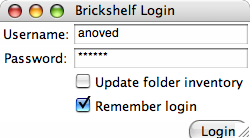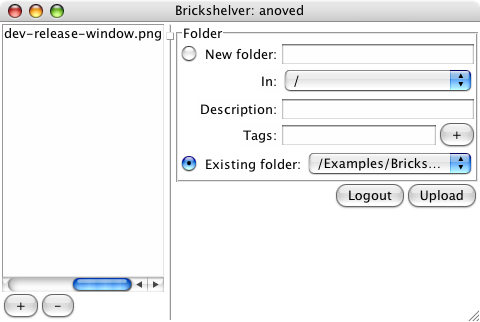Brickshelver Development Release
Brickshelver is a small utility I have written to simplify the process of uploading files to Brickshelf, a popular site for LEGO hobbyists.
When you start Brickshelver, you log in using your Brickshelf account. Brickshelver maintains a list of your Brickshelf folders, but it takes a few moments to conduct this inventory. You can skip this step after the first run for faster logins, but in this case Brickshelver will not be aware of any new folders created via the regular web interface.

You can add files to the list of files to upload by clicking the “+” button or by dragging them to Brickshelver’s Dock icon. The files will all be uploaded to the indicated folder, which can be an existing folder or a new folder created with Brickshelver.

Clicking “Upload” will automatically zip the files and upload them to Brickshelf, creating a new folder if necessary. Upload status is reported in the space to the left of the “Upload” button.
Important Notes
This release consists of a stand-alone application for Mac OS X. This application exhibits many inconsistent or unconventional behaviors, as Brickshelver is actually a Tcl/Tk script bundled in a generic application wrapper. There are a large number of issues that need to be addressed and features that need to be improved, including but not limited to:
- Quit via File→Close or by closing the window, but not via Brickshelver→Quit
- Can’t drag files into the actual window
- Localization
- Layout and appearance quirks
- File type validation
- Cross platform support (specifically, zip and preferences mechanisms)
- Full paths look dopey in file list
I am content with Brickshelver in its current state, but I caution others that it is alpha quality software. Further development depends on the reaction to this release; how to proceed is clear, but I am eager to work on other projects instead.
Download Brickshelver Development Release 2.6MB .tar.gz
Your folder inventory and account information (including unencrypted Brickshelf password) are stored on your computer in ~/Library/Preferences/net.anoved.brickshelver.plist. The format of this file may change in any future releases.
Posted on Monday, August 6th, 2007. Tags: LEGO.